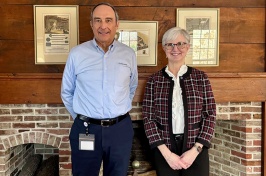As an intellectual property scholar, Alexandra Roberts has kept a watchful eye on rapid changes in the way technology impacts the delivery of information, entertainment, and branded content to modern consumers. The Assistant Professor of Law at UNH Law has observed the progression from television screens to computer screens to smartphone screens to tablets.
Trends evolve quickly.
Not coincidentally, so does her classroom. Gone from her Entertainment Law course is the traditional casebook, replaced by ever-evolving legal discussions surrounding reality television and red carpets.
The methods have certainly changed. But the education remains firmly rooted in foundational law.
“My Entertainment Law students read cases about Hulk Hogan and an episode of Cops this semester, and we talk about Kim Kardashian all the time,” Roberts said. “But what’s really going on underneath it all is they are learning about core areas of law. They’re studying copyright, trademark, trade secrets, privacy torts, contract issues, labor and employment issues, defamation – so there’s substance there, and it’s substance that will remain relevant no matter what areas these students will go on to practice in.”
Roberts knows a thing or two about practice herself. She spent several years in the intellectual property litigation group at Ropes & Gray LLP, working in both its New York City and Boston offices. It was during her time at Ropes & Gray that she discovered her passion for teaching law, as she said she enjoyed training junior associates in connection with assignments and document reviews and mentoring those on her team.
Roberts followed her time at Ropes & Gray with a one-year stint teaching trademarks as a Visiting Assistant Professor at Boston University School of Law before arriving at UNH Law three years ago – where she quickly discovered that professors with practice experience are the rule, not the exception.
“Our faculty members have extensive practice experience, and we’ve made it a priority to incorporate these types of exercises into all of our classes, not just those billed as experiential,” she said.
UNH Law prides itself on preparing practice-ready lawyers, combining those experiential courses with nationally-recognized legal residency and clinic programs to give students invaluable real-world experience before they graduate. Roberts helped form UNH Law’s Sports and Entertainment Law Institute – offering students an opportunity to take innovative courses in sports, entertainment, advertising, film, television and music law, among others – which has placed students in legal residencies with companies like Sony Music Entertainment, Under Armour, and Calvin Klein.
“Practice-based learning sets our students up to succeed. Even before they graduate, they are incredibly desirable to employers compared to their peers at other schools,” Roberts said. “It enables our students to hit the ground running—they’ve already replied to a trademark office action, represented a client in a domain name dispute, drafted a coexistence agreement. Through their classes, legal residencies, and clinical work, our students have experience with things that some lawyers don’t see until they’ve been out of school a year or more.”
Roberts is focused on making the classroom experience equally rewarding, and that approach embodies UNH Law’s commitment to customizing each student’s legal education. Roberts often adapts her curriculum based on the interests of her students, surveying them before the course starts and discussing their areas of interest throughout the semester.
Roberts said she uses that feedback and locates applicable modern cases accordingly.
Her interest in trademark and copyright law is born from a love of language. Roberts has a Master’s Degree in English from Stanford (she later earned her JD from Yale Law), and describes herself as “a lover of literature and poetry.”
“For me there was always a nice symmetry in studying trademark law, because trademark law is about doing things with words and all the many connotations and denotations words can have, the ways in which consumers understand them and the ways in which companies use them,” she said.
Roberts’s current scholarship centers on the use of hashtags as trademarks, both on and off of social media. Her expertise has been sought out and featured by outlets such as Fortune.com, and she’s a highly-regarded writer and commenter on how digital trends are changing the ways consumers interact with trademarks and brands.
That passion for trademark law made Roberts a great fit in UNH Law’s intellectual property department (the school ranks No. 5 nationally for the study of IP law, according to US News & World Report), and she spent her first two years as the Director of UNH Law’s Franklin Pierce Center for Intellectual Property prior to joining the tenure track faculty this fall.
It’s there that she’s found a home among a faculty of fellow professors who share her desire to make the UNH Law experience valuable – and unique – to every student that comes through her classroom.
“One of the major benefits of UNH Law is how small it is. Every student has one or more faculty members who know them really well and can reach out on their behalf,” Roberts said. “We have enough time and attention to go around, and nobody slips through the cracks here.”
Article by Keith Testa
















































